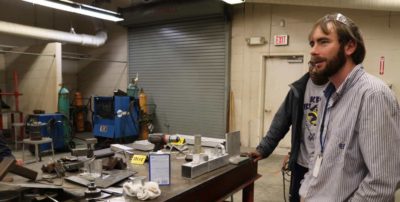Last October, Loistine DeFreece, Robeson County Public Schools’ board chair, was cooking steaks for her husband’s birthday the day before Hurricane Matthew took her home. Like so many in eastern North Carolina, DeFreece didn’t expect the tragedy the storm would bring.
“It just left a tremendous amount of devastation” she said.
On Thursday, Superintendent of Public Instruction Mark Johnson visited Robeson County, an area still facing struggles five months after the storm. Since he was elected in January, Johnson has toured schools throughout the state, and West Lumberton Elementary School was his latest stop.
Johnson said he wants to ensure that he represents schools’ needs at the state level.
“One of my main priorities for the Department of Education in North Carolina is to be the people in Raleigh who support local districts,” Johnson said. “The best way to do that is to come put your feet on the ground and see what these local districts are going through.”
Johnson met with Tara Bullard, principal of West Lumberton Elementary, which has been housed in Lumberton Junior High School since the storm last fall. He also met with other school system leaders and local board of education members.
Johnson said these trips expose him to the realities of North Carolina students and that he hopes to address the issues he sees people facing through his work as superintendent.
“Before you really go out and tell people what they should do, you should listen to them,” Johnson said. “You should say, ‘What’s working? What’s not working?'”
Lumberton was one of the hardest hit areas in the state. West Lumberton’s building has significant damage, and system leaders are in the process of hearing from FEMA and dealing with insurance. The board of education will then have to decide whether to repair the building, build elsewhere, or shut down the school altogether.
Robeson County Public Schools lost their central office building as well, and a large part of W.H. Knuckles Elementary School was also flooded. At West Lumberton, Assistant Superintendent Shanita Wooten said there are around 30 students who have not returned since the storm. Daily, buses go as far as Fayetteville to pick up displaced students living in motels or with relatives outside the county.
Bullard said students still deal with the trauma of the storm every day. The town recently had a thunderstorm, and she said many of the kindergarteners were terrified. She said she understood as she was driving around, looking at the water levels, making sure the water wasn’t rising.
Johnson said the school and its staff play a big role in returning some sense of consistency in students’ lives.
“I’m amazed by the resilience that this community has shown,” Johnson said. He went into elementary classrooms to speak with students and teachers. He sat down to listen to DeFreece’s story. He visited the central office and the elementary school.
“There are still the carcasses of the rotted-out pumpkins in front of the school,” Johnson said as we walked around the building. “I mean time just stopped.”
Wooten said the board has to gauge whether or not families will be returning to the area. If there isn’t a large enough population in the area, a rebuild is not the best solution. The children who used to go attend West Lumberton would have to go elsewhere. Communities across the eastern region of the state are asking similar questions. In Princeville, many wonder whether or not to rebuild the elementary school they lost to flooding.
Dee Grissett, president of the North Carolina Association of Educators in Robeson County, said many nearby residents are elderly or do not have the money to buy flood insurance or make the necessary adjustments to their homes — like raising them a few feet from the ground.
Johnson said he is working with legislative leaders to find problems to flood-damaged schools and communities.
“We are in the General Assembly every day talking to lawmakers,” he said. “And we’re not just talking about the issues of testing, of standards, of teacher pay, of principal pay, we’re talking about these issues too. It’s a privilege and an honor to be able to be a wide-elected official who can go to these areas, who can put boots on the ground, and then come back and tell the leadership of the General Assembly what we have seen and what the needs are here, and really champion the needs.”



